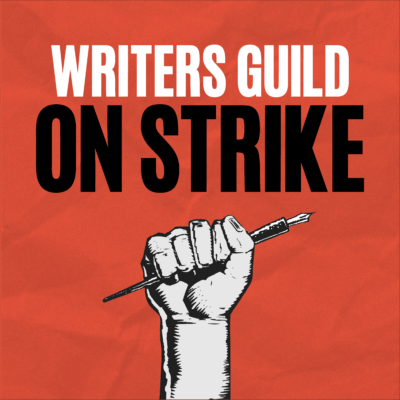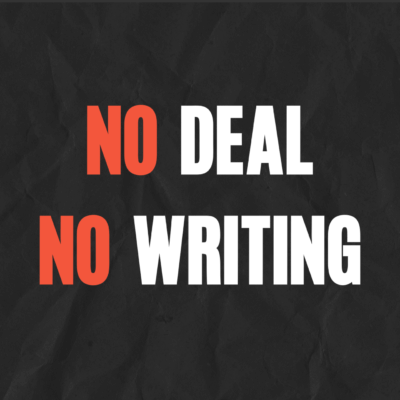
For the latest WGA Strike Updates and Picket Schedules WGA STRIKE HUB HERE
The day I received my WGA, Writers Guild of America email saying I was accepted into the union was one of the proudest days in my career.
Today, going on strike with as a WGA writer is heartbreaking and terrifying but one-hundred and ten percent the right thing to do.
There is not one writer in the WGA that wanted to go on strike. Far from it. So many of us are struggling, and that’s the reason we’re fighting for fair pay. But we all agree that with the way the industry has changed with streaming writers need to be compensated fairly.
Right now, that’s not happening. Not even close.
For weeks our WGA negotiating committee has been working tirelessly to reach a deal with Netflix, Amazon, Apple, Disney, Discovery-Warner, NBC Universal, Paramount, and Sony under the umbrella of the Alliance of Motion Picture and Television Producers (AMPTP).
The deadline was May 1st at midnight. A few hours before midnight, a statement from the AMPTP showed up on social media saying that talks had broken down. there was no deal.
We’d been warned to be careful with much misinformation in the press, so I wanted to hear from my union.
A few minutes later, I got an email from the WGA.
WGA ON STRIKE.
It was official. This is my first strike. I am ready to do everything I can to help with this fight for all WGA writers. I’m also fighting for all the writers like I was only a few years ago, that are working so hard to sell their first project and be accepted into the union.
When the WGA strike email came, it wasn’t a surprise. I’ve feared this would be the case for months. But it was still a gut punch to see how little the AMPTP was willing to negotiate. This statement at the end of the email from the WGA Negotiating Committee hit me especially hard.
Here is what all writers know: the companies have broken this business. They have taken so much from the very people, the writers, who have made them wealthy. But what they cannot take from us is each other, our solidarity, our mutual commitment to save ourselves and this profession that we love. We had hoped to do this through reasonable conversation. Now we will do it through struggle. For the sake of our present and our future, we have been given no other choice.
IN SOLIDARITY,
WGA NEGOTIATING COMMITTEE
You can read the full statement HERE.
Another quote that hits straight to the point:
We have reached this moment today not of our own choosing but because the companies’ assault on writer income and working conditions have pushed us to an existential brink.
CHRIS KEYSER WGA NEGOTIATING COMMITTEE CO-CHAIR
Through different channels, including social media, I’ve had dozens of pre-WGA writers asking for advice on how they can help support the WGA strike effort. They know this is their fight, too, and we’re doing this for them as well so they can have a future doing what they love.
I also have friends in the DGA and SAG/AFTRA wanting to help and so many more.
From what I’ve been told, this is the first time we’ve really seen this kind of solidarity for all the different entertainment unions and unions like the Teamsters, as I believe everyone is realizing the crisis we are facing. We’re all fighting for the same thing, so we must stand strong and stand together!
I’ve put together a list of key links below for anyone wanting more information on the WGA strike, including everything from the WGA Strike rules and FAQ to the picket locations and how everyone can show their support.
If you’re in the press, when it comes to answering specific questions about the strike, I’ve provided a link below where you can reach out to get your WGA strike questions answered for the most updated and accurate information. ,
WGA SOURCES FOR INTERVIEWS: HERE
WGA STRIKE HUB HERE
WGA STRIKE RULES & FAQ HERE
WGA PICKET SCHEDULE HERE
STAND WITH WRITERS – SHOW YOUR SUPPORT HERE
SOCIAL MEDIA TOOLKIT FOR WGA STRIKE HERE
MY PERSONAL WGA STORY
My personal story of how I got into the WGA union shows my own battle when I stuck up for something I believed in.
The WGA is a union I’d always admired for its decades of fearless hard work championing and protecting writers.
After breaking into the entertainment industry in 2017, selling my first spec rom-com screenplay A Christmas Prince to Netflix, followed by my next spec script Christmas Camp to Hallmark, I had learned enough in those negotiations as a non-union writer to know I wanted and needed to get into the union as fast as possible.
For my next project, my first TV movie with Lifetime, Every Day is Christmas starring Toni Braxton, I was ecstatic to be chosen from a talented field of writers with much more experience than I had, to write an original Christmas movie for Toni. It would be Lifetime’s showcase holiday movie that year. It was the opportunity of a lifetime, pun intended.
Before this offer, I’d promised myself my next movie would be union so I could join the WGA. When I told the production team this, the pushback was immediate. “Absolutely not!” was the PG version of what I heard.
I was told it wasn’t in the production company’s budget to pay into the union’s health care and pension plan. The biggest concern was paying ongoing residuals, even if I was only making the union minimum pay.
Several people were quick to educate me that of the 100-plus Christmas movies cranked out every year by Hallmark, Lifetime, and Netflix, rarely were they ever written by WGA writers. No one wanted to pay residuals because these movies were on repeat every holiday season.
This meant these coveted Christmas movie writing jobs were going to non-union writers that were happy to be paid a few thousand dollars to get their first writing credit. I’ve had writers tell me they’ve been offered a flat fee as low as $5,000 to write an original Christmas movie. They were told they were lucky to get the opportunity.
Beyond this ridiculously low fee to write original movies for companies making millions off them, non-union writers were also paying in other ways that could be even more devastating.
I’ve heard horror stories of how writers took the crappy pay to get their first feature credit only to have that written by credit taken away from them, despite the fact they wrote it, and their contract promised them credit. The list goes on of other things that were taken away from these writers who already had gotten so little.
The only way these writers could try and fight for what was in their contracts was to spend more than what they made in legal fees. You get the idea. No one thinks the magical, joyful, uplifting world of writing Christmas movies has a dark side until they’re in it, and then it’s too late.
In my case, on my Lifetime movie, Every Day is Christmas, I loved talking with the network and the production team, but I was still standing firm.
WGA or bust.
I was on my own and what the industry called a “baby writer” because I was just starting my screenwriting career. Many warned me if I blew this Lifetime movie opportunity I likely wouldn’t work again. I would be labeled as “difficult.”
But I was an award-winning journalist, being labeled “difficult” didn’t scare me. I’d spent my career as a crime reporter, an investigative reporter, and a war correspondent. I’ve lived my life fighting for what was right and what I believed in, and I believed in the WGA.
Because this was a new industry for me and I was going it alone, I knew after doing two movies as a non-union writer that I wanted and needed the WGA behind me. I needed someone to have my back.
When the production company would budge about making it a WGA project, I respectfully declined the offer. I wished them well. I told them I hoped we could work together on another project down the road when they were ready to do a union project with me.
Instead of us both walking away I was offered a compromise.
Since the movie was being shot in Canada, the production company offered to make it a WGC project. Writers Guild of Canada. I didn’t even know this was possible since I’m an American, but it was.
While I wouldn’t get my to join the WGA union, I would get to join the sister union WGC. This meant I wouldn’t get residuals like you do with the WGA, or a US pension and health care contribution, but I could get what I really wanted at that time, the protection of union rules the production company had to follow, that we all agreed to.
Also, when you’re in the WGC it’s easier to get into the WGA and costs less. So, the plan was when I went to join for my next movie I’d be all set.
All of us felt like this was a great solution. We all gave something up but got something in return. And to this day this project is still one of my favorite projects I’ve worked on. With an amazing team of collaborators, we created something special, and isn’t that what it’s supposed to be all about?
The following year when Lifetime called and asked if I could step in quickly to write another original Christmas movie after one of their movies fell through, I said absolutely yes! BUT I needed this movie to be under the WGA so I could join the union
All parties agreed and a WGA writer was born!
Still, to be honest, even though this was my first WGA project, it wasn’t all snowflakes and Christmas cookies. But at least now I have my union, the WGA behind me, helping me every step of the way.
I’m grateful for all the WGA has done and continues to do for writers. As for my fellow writers, I’ve never met a more passionate and talented group of people who just want to do what they love to do, and tell the stories everyone loves so much.
It shouldn’t be that hard to be paid fairly when people are making billions off our creations. We’re only asking for 2% of what studios make off our stories. They can’t do it without us.
So, on day one of this WGA strike, I’m proud to be part of the WGA, a union that’s about to rewrite history…again.
I hope you will stand with me to support all WGA writers, pre-WGA writers, support staff, and unions like the DGA, and SAG/AFTRA.
We’re all in this together. #Solidarity #WGAStrong

